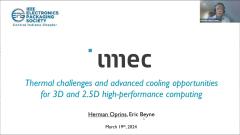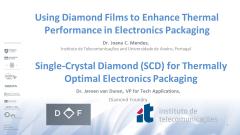(37:36) - Andrew Tay, National University of Singapore
Summary: Detecting sub-micron time-dependent thermal defects and identifying those that represent potential device failures is a challenge in the thermal analysis of today’s complex electronic devices. The scaling of device features results in a significant reduction in time response and an increased sensitivity to transient events. With today’s complex devices very small localized hot spots can occur due to an unintended functional anomaly in a circuit with a tight design margin or a timing perturbation resulting from a small change in capacitance or another parameter elsewhere in the circuit. As device features continue to shrink so do the challenges of detecting circuit-induced thermal defects. While gaining a full understanding of the device thermal behavior is getting more difficult, extremely high-power densities is increasing the importance of having this understanding. In this presentation, various techniques of measuring the temperature distributions over IC devices and locating hot spots for failure analysis will be reviewed. Several case studies will be described.
Dr. Andrew Tay is currently a Visiting Scientist at the Singapore Hybrid-Integrated Next-Generation -Electronics Centre (SHINE), Department of Electrical Engineering, National University of Singapore. He was previously a Professor of Mechanical Engineering at the National University of Singapore. He obtained his B.E. (Hons I and University Medal) and PhD in Mechanical Engineering from the University of New South Wales, Australia. His research interests include electronics packaging (thermo-mechanical failures, delamination, effects of moisture, solder joint reliability); thermal management of electronic systems and EV batteries, infrared and thermoreflectance thermography, solar photovoltaics reliability and fracture mechanics. He was awarded the 2019 IEEE EPS David Feldman Outstanding Contribution Award, the 2012 IEEE CPMT Exceptional Technical Achievement Award, and the 2012 IEEE CPMT Regional Contributions Award. For his outstanding contributions in the application of engineering mechanics to electronics and/or photonics packaging, he was awarded the ASME EPPD Engineering Mechanics Award in 2004. He was also awarded an IEEE Third Millennium Medal in 2000. He is a Fellow of ASME and a Senior Member of IEEE.
For videos/slides from other talks at the Symposium on Reliability of Electronics and Photonics Packaging (REPP'22), please visit our website and join our IEEE Dlist: attend.ieee.org/repp
(37:36) - Andrew Tay, National University of Singapore
Summary: Detecting sub-micron time-dependent thermal defects and identifying those that represent potential device failures is a challenge in the thermal analysis of today’s complex electronic devices. The scaling of device features results in a significant reduction in time response and an increased sensitivity to transient events. With today’s complex devices very small localized hot spots can occur due to an unintended functional anomaly in a circuit with a tight design margin or a timing perturbation resulting from a small change in capacitance or another parameter elsewhere in the circuit. As device features continue to shrink ...
 Cart
Cart Create Account
Create Account Sign In
Sign In



